Ovid's Metamorphoses and Further Metamorphoses discussion

This topic is about
Metamorphoses
The Metamorphoses - The 15 Books
>
Book Thirteen
date newest »
newest »
 newest »
newest »
message 1:
by
Kalliope
(new)
-
rated it 4 stars
Sep 22, 2018 06:34AM
 Discussion of Book Thirteenth.
Discussion of Book Thirteenth.
reply
|
flag
 Most impressive image from Book 13: A distraught Hecuba, realizing that the one son she'd thought had survived, wreaks her vengeance on his murderer by not only gouging out his eyes, but by then proceeding to rip out that which had held them. Made me shiver reading this. Afterward, Ovid tersely comments that 'even the Gods took pity on her as one who did not deserve such sorrows'. Nice of them to show that under their dominant selfishness and hubris, the glimmer of a real heart still beat.
Most impressive image from Book 13: A distraught Hecuba, realizing that the one son she'd thought had survived, wreaks her vengeance on his murderer by not only gouging out his eyes, but by then proceeding to rip out that which had held them. Made me shiver reading this. Afterward, Ovid tersely comments that 'even the Gods took pity on her as one who did not deserve such sorrows'. Nice of them to show that under their dominant selfishness and hubris, the glimmer of a real heart still beat.
 The contest between Ajax and Ulysses for the armor of Achilles seems to have provoked various responses from poets, playwrights etc. over the succeeding centuries.
The contest between Ajax and Ulysses for the armor of Achilles seems to have provoked various responses from poets, playwrights etc. over the succeeding centuries.Jacob van Maerlant a Dutch poet of the 13th c. in his version concluded that the Greeks' immediate decision in favor of Ulysses demonstrates that they valued cunning and deceit over valor and bravery.
In the 17th c. English playwright James Shirley suggested that the contest itself misses the point entirely; rather, he focused on the fact that heroes (and everyone else) in the end are overcome by death and that perhaps the greater their heroics, the more tragic their demise. He included a poem which became known as "Death the Leveler" and which seems to have outlived the play itself:
THE glories of our blood and state
Are shadows, not substantial things;
There is no armour against Fate;
Death lays his icy hand on kings:
Sceptre and Crown
Must tumble down,
And in the dust be equal made
With the poor crookèd scythe and spade.
Some men with swords may reap the field,
And plant fresh laurels where they kill:
But their strong nerves at last must yield;
They tame but one another still:
Early or late
They stoop to fate,
And must give up their murmuring breath
When they, pale captives, creep to death.
The garlands wither on your brow,
Then boast no more your mighty deeds!
Upon Death's purple altar now
See where the victor-victim bleeds.
Your heads must come
To the cold tomb:
Only the actions of the just
Smell sweet and blossom in their dust.
 Steve wrote: "Most impressive image from Book 13: A distraught Hecuba, realizing that the one son she'd thought had survived, wreaks her vengeance on his murderer by not only gouging out his eyes, but by then pr..."
Steve wrote: "Most impressive image from Book 13: A distraught Hecuba, realizing that the one son she'd thought had survived, wreaks her vengeance on his murderer by not only gouging out his eyes, but by then pr..."The most gripping image of Hecuba I've encountered is by the Russian-born American painter Alexander Karnevsky; it conveys for me the agony of motherhood at the deaths of all her children:
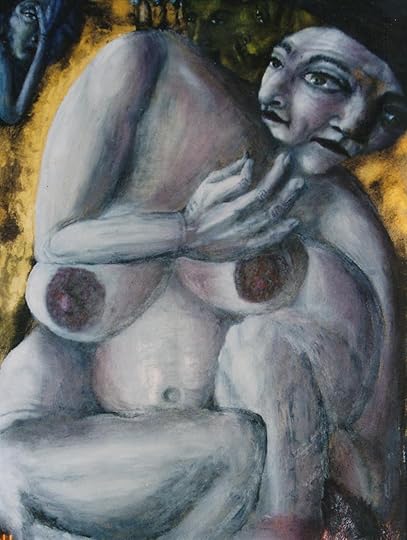
 The 13th book opens with a debate club rhetorical exercise, brawn vs brain. Of course Ulysses wins... Apparently the trope of the wily coyote appears in folklore all over the world, Europe, Americas, Africa...reading Homer's Odyssey I expected a hero, but he's described as a cunning trickster...Ovid seems to like this aspect of his personality...Ovid uses the antique epic structures and tropes, but weaves in irony and self referential imagery that Homer doesn't have...I haven't read Virgil, but I doubt he had Ovid's self awareness....
The 13th book opens with a debate club rhetorical exercise, brawn vs brain. Of course Ulysses wins... Apparently the trope of the wily coyote appears in folklore all over the world, Europe, Americas, Africa...reading Homer's Odyssey I expected a hero, but he's described as a cunning trickster...Ovid seems to like this aspect of his personality...Ovid uses the antique epic structures and tropes, but weaves in irony and self referential imagery that Homer doesn't have...I haven't read Virgil, but I doubt he had Ovid's self awareness....
 Thanks Jim for the amazing painting: between you and Peter, I've added almost a hundred paintings to my 'art' file which I use as my rotating screen saver. This one truly captures her agony. To Elena: my impression of The Aenied is that it was fine for the first four books, but rather tedious thereafter. But perhaps this was coloured by my love of Berlioz's Les Troyens, so after Aeneas leaves Dido behind, the story seemed to me to lose its way.
Thanks Jim for the amazing painting: between you and Peter, I've added almost a hundred paintings to my 'art' file which I use as my rotating screen saver. This one truly captures her agony. To Elena: my impression of The Aenied is that it was fine for the first four books, but rather tedious thereafter. But perhaps this was coloured by my love of Berlioz's Les Troyens, so after Aeneas leaves Dido behind, the story seemed to me to lose its way.
 I have to disagree with the Aeneid being tedious - it's wonderful! But is dependent on a decent translation (the original Latin is beautiful - but dense, I've only managed a few key books).
I have to disagree with the Aeneid being tedious - it's wonderful! But is dependent on a decent translation (the original Latin is beautiful - but dense, I've only managed a few key books).
 The Judgement of Arms
The Judgement of ArmsI agree with what others have said above about this being a standard rhetorical exercise used in Roman (and Renaissance humanist) schools. But it also has another contemporary resonance for Ovid's original audience as it seems to replay or at least comment on the struggle at the heart of the recent civil wars between Augustus and Marc Antony for the 'arms' or legacy of Julius Caesar.
Augustan propaganda tried to remake Antony as the brawnish thug, without education or eloquence (not true in reality), and to compensate for Augustus' own lack of military experience (he had asthma from a boy) by playing him up as the 'thinking man'.
Ovid, I think, makes lots of sly digs about how 'cunning' slips over into deceit in the case of Ulysses/Augustus ('to fight with lies and ingenious talk'), and his Ajax/Antony isn't as rhetorically-lacking as is claimed: 'is he to take the best arms, because he refused to take up any?'.
Ovid's Ulysses particularly reveals himself as a demogogue when he claims, for example, that because he brought Achilles to the war, 'Achilles' deeds are my own' (l.171), and when he boasts of having pushed Agamemnon, against his better judgement, to sacrifice his daughter, Iphigenia: 'this he refused to do. He resented the gods' decree, and the king still harboured a father's love. But my persuasions induced him to harden his heart' (ll.186ff.)
Interestingly, Shakespeare seems to have 'got' this slippage in Ovid:
Ovid's Ajax says'No one shall have the power to conquer Ajax, but Ajax!'
Cf. Shakespeare's monument scene between the dying Antony and Cleo:
MARK ANTONY
Peace!
Not Caesar's valour hath o'erthrown Antony,
But Antony's hath triumph'd on itself.
CLEOPATRA
So it should be, that none but Antony
Should conquer Antony; but woe 'tis so!
This is yet another example of the sly critiques of contemporary politics that Ovid embeds in the Met.
 Steve wrote: "Most impressive image from Book 13: A distraught Hecuba, realizing that the one son she'd thought had survived, wreaks her vengeance on his murderer by not only gouging out his eyes, but by then pr..."
Steve wrote: "Most impressive image from Book 13: A distraught Hecuba, realizing that the one son she'd thought had survived, wreaks her vengeance on his murderer by not only gouging out his eyes, but by then pr..."The story of Hecuba's vengeance appears earlier than Ovid, in Hecuba by Euripides. I read it last year. After I finish the Met there are some other Greek plays I want to read. I've never read Ajax but I think it will be an interesting read now that I have read Ovid's version.
Clodia: I read The Aeneid in the Robert Fitzgerald translation. It didn't become an all time favorite, but I'm glad I finished it. The translator mentions that his war experiences gave him a new appreciation for the later books of the poem. Virgil starts with the 'Odyssey' part of the story (the adventure) and ends with the 'Iliad' part (the war) so it doesn't make sense to me to just ignore one of them. Even though I have a few favorite stories in the Met, I think I found The Aeneid a little bit more powerful overall.
 Roman Clodia wrote: "The Judgement of Arms
Roman Clodia wrote: "The Judgement of ArmsI agree with what others have said above about this being a standard rhetorical exercise used in Roman (and Renaissance humanist) schools. But it also has another contemporar..." I would have completely missed Ovid's allusions to Antony and Augustus, then Shakespeare's allusion to Ovid...so many treats embedded in these stories...various authors' conversations with each other over the centuries...
 Beth wrote: "Even though I have a few favorite stories in the Met, I think I found The Aeneid a little bit more powerful overall."
Beth wrote: "Even though I have a few favorite stories in the Met, I think I found The Aeneid a little bit more powerful overall."Yes, it's difficult to make comparisons when they're so different in intention, tone and style - but I do feel that an acquaintance with the Aeneid is very helpful as literary context for the Met.
 Elena wrote: "Roman Clodia wrote: "The Judgement of Arms
Elena wrote: "Roman Clodia wrote: "The Judgement of ArmsI agree with what others have said above about this being a standard rhetorical exercise used in Roman (and Renaissance humanist) schools. But it also ha..."
Another rhetorical contrast in The Judgement of Arms is that Ajax speaks in a direct, logical, well organized manner. It is short and to the point, which was viewed as the Roman ideal. Ulysses’ speech is a longer, more allusive discourse that was considered Greek or “too oriental.” (An early example of stereotyped “orientalism” that persists in Western culture. ) Although Greek culture and learning was valued in Augustan period, it was also a point of contention. Augustus claimed to promote a Latin style for Roman culture, but his son Tiberius was educated by Greek tutors. Tiberius even retired from public life for a period to study. He was a reluctant emperor who would have preferred a scholarly life.
Therefore two types of rhetoric and two styles of life are contrasted. (This post is a synthesis of my secondary reading. I can’t immediately call up the references, although Edward Said wrote the seminal work on Orientalism.)
Did others find Ulysses less admirable after the debate, even though he “won?” Ajax’s arguments seem to resonate through rest of book.
For example, The voyage of Aeneus reverses the voyage of the Odyssey and takes some more shots at Ulysses/Odysseus by rescuing his abandoned crew member and reminding readers in other ways that U/O did not keep faith with his men.
 Highly recommend Greece and the Augustan Cultural Revolution AJS Spawforth. My post owes much to his discussion.
Highly recommend Greece and the Augustan Cultural Revolution AJS Spawforth. My post owes much to his discussion.
 As a natural scientist I have known the element Palladium (atomic number 46, just in front of silver) for a long time. Others may also know it for its usage in jewelry. But I have never bothered to investigate the origin of its name. Thanks to Ovid I now know that it originates from the wooden image of Pallas Athena, which had protected the Trojans until Odysseus stole it. You never stop to learn.
As a natural scientist I have known the element Palladium (atomic number 46, just in front of silver) for a long time. Others may also know it for its usage in jewelry. But I have never bothered to investigate the origin of its name. Thanks to Ovid I now know that it originates from the wooden image of Pallas Athena, which had protected the Trojans until Odysseus stole it. You never stop to learn.Odysseus and Diomedes steal the Palladium from Troy. ca. 360–350 BC from Reggio di Calabria.
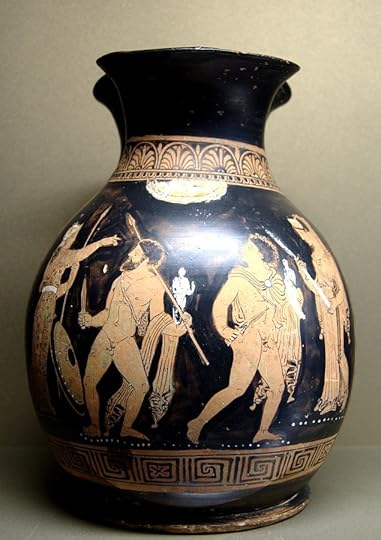
 Jim wrote: "My apologies; I've tried several versions of that image and it looks OK but refuses to upload"
Jim wrote: "My apologies; I've tried several versions of that image and it looks OK but refuses to upload"Jim, is this the picture that you had in mind?
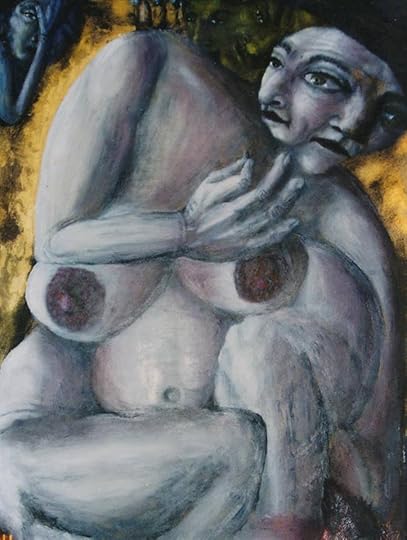
 Historygirl wrote: "Elena wrote: "Roman Clodia wrote: "The Judgement of Arms
Historygirl wrote: "Elena wrote: "Roman Clodia wrote: "The Judgement of Arms... Did others find Ulysses less admirable after the debate, even though he “won?. ..."
Yes, Historygirl, I did. At least at first. Ajax is the strongest and bravest warior second to Achill and related to his family. So the choice seemed to be clear cut. There more when Ulysses overdoes his self-praise boasting that all achievements of Achill and Ajax should actually be attributed to him, as he brought them (back) to battle. At this point of his speech I had developed a clear dislike for Ulysses. But when I thought about his arguments that only Troi lost its invincibility only after the theft of the Palladium I changed my mind. And we all know that the final victory is clearly the merit of Ulysses.
The argument between Ajax and Ulysses has been one of the most intellectually entertaining scenes for me so far. Reading it I sometimes fealt like being in a US court room drama à la "Twelve Angry Men".
 Peter wrote: "Jim wrote: "My apologies; I've tried several versions of that image and it looks OK but refuses to upload"
Peter wrote: "Jim wrote: "My apologies; I've tried several versions of that image and it looks OK but refuses to upload"Jim, is this the picture that you had in mind?
"Yes indeed. A very compelling image.
 Beth wrote: "The story of Hecuba's vengeance appears earlier than Ovid, in Hecuba by Euripides. I read it last year. After I finish the Met there are some other Greek plays I want to read. I've never read Ajax but I think it will be an interesting read now that I have read Ovid's version."
Beth wrote: "The story of Hecuba's vengeance appears earlier than Ovid, in Hecuba by Euripides. I read it last year. After I finish the Met there are some other Greek plays I want to read. I've never read Ajax but I think it will be an interesting read now that I have read Ovid's version."Yes, this section of the Met. is almost an epitome of the Trojan cycle of Athenian tragedies (as well as the ones Beth mentioned, there's The Trojan Women, the two Iphigeneia plays we mentioned earlier, the Philoctetes).
I've always been puzzled that Ajax, the great warrior, is changed into a flower - which in earlier tales has been associated, I think, with beautiful adolescent boys (Narcissus, Hyacinthus). In case anyone's notes don't elucidate, 'aiai' is the Greek for something like 'alas!', and Aias is Ajax in Greek.
 An interesting moment is the death of Polyxena (13.478):
An interesting moment is the death of Polyxena (13.478):'And even then, as she fell, she preserved her maidenly virtue | arranging her garments to cover the parts men should not see.'
This is almost a direct quotation from Euripides but is also used of the assassination of Julius Caesar: when he's stabbed in the Theatre of Pompey, he's said (I can't remember the source - sorry!) to have pulled his toga down over his exposed thighs and up over his face to hide his dying agony from his assailants.
 We're more or less at the point where Ovid's text crosses over from telling Greek to Roman myths.
We're more or less at the point where Ovid's text crosses over from telling Greek to Roman myths. The long-ish Acis and Galatea has lots of literary in-jokes about pastoral as a genre, especially in relation to Theocratus' Idylls and Virgil's Eclogues. I'll no doubt have more to say once I've re-read it.
 Elena wrote: "The 13th book opens with a debate club rhetorical exercise, brawn vs brain. Of course Ulysses wins... Apparently the trope of the wily coyote appears in folklore all over the world, Europe, America..."
Elena wrote: "The 13th book opens with a debate club rhetorical exercise, brawn vs brain. Of course Ulysses wins... Apparently the trope of the wily coyote appears in folklore all over the world, Europe, America..."I also took the initial debate as one between braw ad brain, and this being written by Ovid, of course it would have to be the brains which would win.
I have always seen Uysses as a cunning personality. From Homer onwards.
 Roman Clodia wrote: "I have to disagree with the Aeneid being tedious - it's wonderful! But is dependent on a decent translation (the original Latin is beautiful - but dense, I've only managed a few key books)."
Roman Clodia wrote: "I have to disagree with the Aeneid being tedious - it's wonderful! But is dependent on a decent translation (the original Latin is beautiful - but dense, I've only managed a few key books)."RC, which edition of the Aeneid would you recommend? I have the Fitzgerald.
 Peter wrote: "As a natural scientist I have known the element Palladium (atomic number 46, just in front of silver) for a long time. Others may also know it for its usage in jewelry. But I have never bothered to..."
Peter wrote: "As a natural scientist I have known the element Palladium (atomic number 46, just in front of silver) for a long time. Others may also know it for its usage in jewelry. But I have never bothered to..."I didn't know this either. Thanks Peter...
 Roman Clodia wrote: "Beth wrote: "The story of Hecuba's vengeance appears earlier than Ovid, in Hecuba by Euripides. I read it last year. After I finish the Met there are some other Greek plays I want to read. I've nev..."
Roman Clodia wrote: "Beth wrote: "The story of Hecuba's vengeance appears earlier than Ovid, in Hecuba by Euripides. I read it last year. After I finish the Met there are some other Greek plays I want to read. I've nev..."Apart from the Aeneid I am coming out of this read wanting to take up the tragedies again...
 After a longer break I have returned to the Met and enjoy them even more than before. I hope to pick up during the coming days, but first had to finish Book XIII. I was surprised to find no posts about the story of Arcis and Galatea, though it is the plot of a famous opera by Handel.
After a longer break I have returned to the Met and enjoy them even more than before. I hope to pick up during the coming days, but first had to finish Book XIII. I was surprised to find no posts about the story of Arcis and Galatea, though it is the plot of a famous opera by Handel.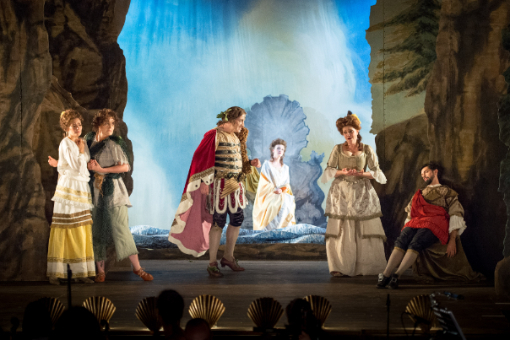
But there are also impressive paintings and sculptures on the topic.
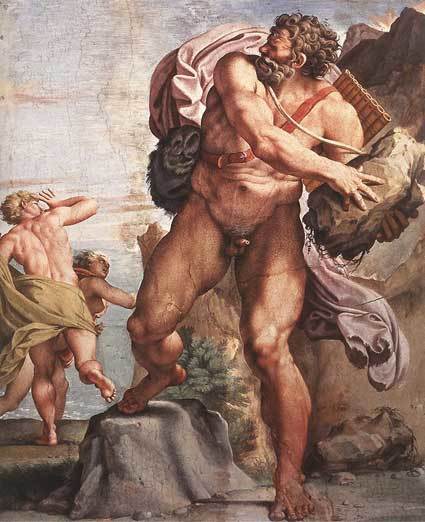
Galatea. Gustave Moreau. 1896. Museo Nacional Thyssen-Bornemisza, Madrid
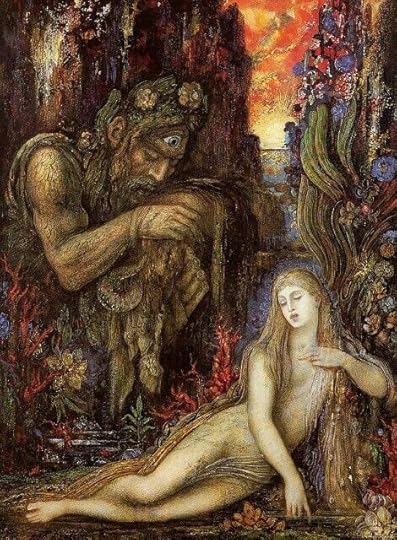
Medici Fountain. Jardin du Luxembourg. Paris
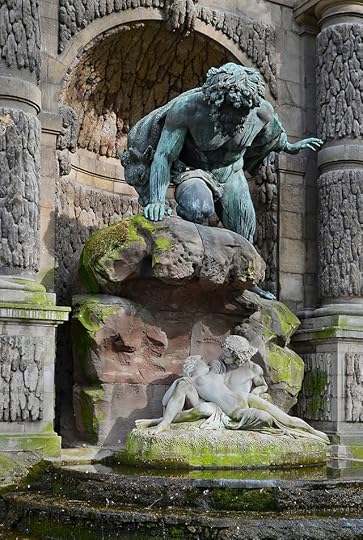
My favourite part of the story, however, is the surprisingly poetical declaration of love by Polyphem. It strongly reminded my of the story of Beauty and the Beast. Starting beautifully almost like the Song of Songs it develops into to a self-praise of a rich peasant. Still it must have made some impression on Galatea as there their relationship had important offspring.
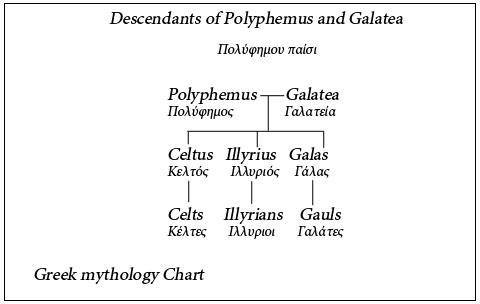
 You're right, Peter about the remarkable Polyphemus progeny. The Met is rife with aetiology; might this account for the talent for poetry and singing for which Celtic peoples are famed??
You're right, Peter about the remarkable Polyphemus progeny. The Met is rife with aetiology; might this account for the talent for poetry and singing for which Celtic peoples are famed??Anyway, thank you for discovering the Moreau painting of Galatea; I've never before paid much attention to Moreau's works but this one is quite special.
 In Book Thirteen, greed has played a huge role throughout the war; its surviving victor’s receive fame by sacking the city. While, immortal’s decree “recognition” at the cost of human lives; both realms, justify their case by coveting anything they desire.
In Book Thirteen, greed has played a huge role throughout the war; its surviving victor’s receive fame by sacking the city. While, immortal’s decree “recognition” at the cost of human lives; both realms, justify their case by coveting anything they desire.Ilium is defenseless and ready for conquest. But who will lead the charge? The Achaean chiefs are gathered to decide the fate of Achilles’s armor. Crafted and designed by Vulcan’s forge in Mount Etna, such protection is a prize worthy for only the greatest of heroes. Bulwark Ajax and wily Ulysses showcase their success in a literal debate of words; with his seventh fold shield raised high, Ajax claim his noble linage to Zeus and that it should “rightfully” be passed to him as Achilles’s cousin.
Ulysses allowed such insults to attack his credibility; until pleading his case amongst the throng of “nobles.” His deeds are only to serve Greece and that the arm’s should “rightfully” be given to father Peleus and mother Thetis. Ulysses won because he is a gifted orator; but Ajax’s strength, is treated as an afterthought. That loss allowed his own demise, as blood flowed upon the earth a Hyacinthus sprouted in place; inscribed in its petals: “AIAI” were the last words spoken by Ajax in Troy.
After the cunning leader returned from Lemnos, he led his allies onward to destroy Troy’s last line of defense. All of its citizens were made an example; Greek soldiers and kings took revenge for their comrades by force. King Priam slaughtered in Jupiter’s temple while their women are reduced to concubines/slaves to their captor’s; such suffering is exemplified greatly with its queen Hecuba.
Her happiness lies within her two surviving children: princess Polyxena and prince Polydorus; both represent hope to a once prosperous kingdom. Achilles’s spirit rose from the earth and “demanded” Polyxena to be sacrificed in honor of his “heroism” in Ilium; unlike most victims, she refused to take a submissive role. Instead of fear, Polyxena embraced death as Neoptolemus (in tears) thrust his blade into her heart.
As her body returned to mother Hecuba, she knows that although her daughter’s life had passed, Polydorus will return to establish Troy again. Using a pitcher to gather water to clean daughter’s body for burial, she spotted Polydorus’s body float across the shore; her attendants screamed in horror. But, the queen is resolved to gain vengeance on the perpetrator; during the war, Priam vouchsafed his son and treasure to the Thracian tyrant Polymestor.
When the Achaean’s claimed victory, he slaughtered the young prince and coveted his inheritance. That “temptation” led to his doom; Hecuba’s adrenaline allowed her to grasp the tyrant’s head and thrust her thumb’s into his brain. Its inhabitants were outraged of their leader’s demise, they attacked with rocks and weapons; Hecuba’s rage was so relentless that she was metamorphosized into a dog. Since she cannot voice her anguish verbally, this form symbolizes the extent of her pain.
While in heaven, the goddess of dawn, expresses her own grief in response to Hecuba’s own tragedy; her beloved son Memnon, died during the war. His body placed in the funeral pyre is the last thing that a “divine” mother cannot stand to remember for all eternity; since her temples are small and follower’s few, Aurora pleads Zeus for honoring son’s courage.
He responded by having Memnon’s ashes change into two flocks of birds battling for supremacy; both sides die and return to ash once more. Each year, as the Memnonides fight, Aurora’s tears are shed onto the earth and form into morning dew to commemorate Memnon’s memory.
Troy is no more, but hope lies with the hero Aeneas; the son of Aphrodite, has survived various obstacles. As a war hero, he cannot be easily captured by Achaean soldier’s seeking retribution; while the city burned, he gathered his: family, household gods, and comrades onto a ship.
Sailing across the sea, they arrived upon the island shore of Delos; its ruler, king Aunis, serves as Apollo’s priest. He welcomed the crew with open arms and invited them to feast in his halls; yet, father Anchises knows that such a wealthy kingdom seems empty without heirs. Aunis explained that all of five children are given fantastical abilities but cannot remain upon their own homeland.
A beloved son, who becomes Andros’s king with the power of prophesy; Apollo’s gift will bring prosperity to his reign. But, his four daughters can “touch” anything into: olive oil, corn, and wine; a powerful gift, which caught the ear of Agamemnon and his army. Arriving upon Delos’s shore, and in one command, they abducted Aunis’s daughters; the king “demanded” their captives to replenish provisions below deck.
As each sister feigned compliance, two escaped to Euboea and the last pair reached their brother’s kingdom; his army followed the sister’s and forced its king to submit to authority. Since Andros has no solid military, his sister’s must return to Agamemnon’s fleet; if humans cannot grant safety on earth, then the god’s must intervene to rescue their “pious” followers. Bacchus heard their prayers by transforming them into doves; as Aphrodite readies herself for travel, Anius’s daughters pull her chariot across the sky.
Throughout the feast, everyone has a tale that explains the infinite power of “divine” intervention; each word spoken, in “their” favor, brings strength back into the gods of Olympus. Awakened at dawn, Aeneas traversed into Apollo’s oracle to seek guidance; as the last prince of Troy, he needs a kingdom to establish a new age.
No one becomes a nomad forever; the prophecy claimed that their new home lies within their ancestral land. But it’s not an easy task; Aunis gives Aeneas an intricate urn depicting the sacrifice of the Coroni. Orion’s daughter’s saved Thebes from a plague by offering their lives; therefore, creating a dynasty will come at a price.
Hoisting their sail upon the breeze, its crew reached the shore of Crete; its climate was stifling and not favorable for conquest. So, they traversed onward toward Italy, until a storm veered them off course; Aeneas’s experience is literally a test of courage because it consisted of “strange” occurrences outside reality.
A wild prophet and a grove talking elm trees, is only foreshadowing to future events. Reaching Buthrotom, Aeneas consulted with the Trojan prophet Helenus; he claimed that Sicily will be their new home, if they survive the treacherous Strait of Messina. Why? The land is occupied by two sea monsters; Charybdis devours ships in her whirlpool, while Scylla’s ravenous dogs consume sailors without care.
In the past, this beast was once a mortal maiden whose beauty caught the attention of numerous suitors. But to her it’s a game; a man arrives to woo Scylla with entreaties of love and graciously reply with rejection. Each attempt is treated as a “victory” and her exploits are treated as gossip to her divine “friends.”
While combing the tresses of Galatea’s hair, the daughter of Nereus, broke down into tears; mortal Scylla can chose whomever she fancied, but for an ocean nymph it cost her happiness. Acis, the son of Faunus, became her lover and his competition was the infamous Polyphemus; a cyclops that pursued Galatea constantly to gain her attention.
His murderous intent revealed his true nature: scorning the gods, ignoring a prophet, and exerting his power by force. The lovers hide behind a cliff and reclined in each other’s arms; until, Polyphemus enters with his flock of sheep. Resting upon the opposite side; he tuned his reed pipe and expressed his emotions through song.
The need to claim Galetea as his wife, the offering of his wealth and status as Poseidon’s son; also, the destruction of Acis’s existence. Caught in the act, Polyphemus raised a boulder and hurled it into his competitor’s head. Crushed to death at the hands of a monster, his body cannot be restored; under her power, Galetea’s lover meamorphosized as a river god.
Finished with her tale, Galatea’s “divine” entourage dispersed and Scylla walked along the shoreline alone; when Glaucus rose from the ocean, she screamed in terror by climbing atop a mountain. Is this a god or a beast? She wondered above ground; Glaucus explained that he was once a mortal. A fisherman by trade, he arrived on an island with beautiful grass; it’s not cut nor touched by mortal hands, the fish he caught revived and swam away.
Such a natural phenomenon must have “divine” properties; he ate two blades and dived deep into the kingdom of Oceanus. The ocean’s king and Queen Tethys agreed that Glaucus is worthy to join with fellow Olympians; his form accommodates the majestic wonder of the sea. Yet, Scylla did not stay to listen; in fact, the god was spurned since the very beginning. Such a pursuit cannot be won alone; Glaucus must journey across the vast sea towards Aeaea to seek Circe’s aid….
Until then, see you in Book Fourteen everyone!!!
Books mentioned in this topic
Greece and the Augustan Cultural Revolution (other topics)Hecuba (other topics)
Ajax (other topics)
The Aeneid (other topics)


